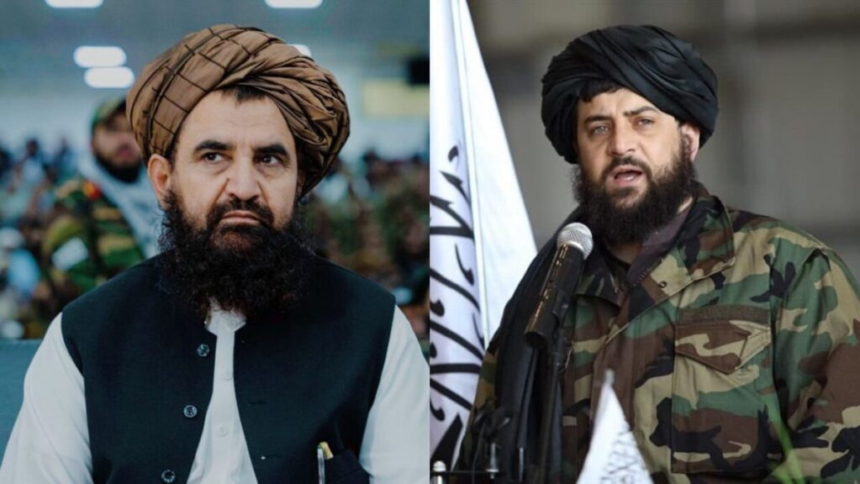RASC News Agency: The Taliban’s senior leadership has fled to Doha, Qatar, for emergency negotiations with Pakistani officials, as intensifying border clashes between the two sides push the already fragile region closer to a new phase of instability and civilian suffering.
According to official sources within the Taliban’s Ministry of Defense, Mohammad Yaqoob Mujahid—the group’s acting defense minister—and Mullah Abdul Haq Wasiq, its intelligence chief, departed for Doha late Friday to engage in discussions reportedly aimed at “de-escalating tensions.” The talks, however, come against a backdrop of mounting bloodshed that many analysts say is the direct consequence of the Taliban’s failure to establish coherent state authority or diplomatic credibility.
Over recent days, Pakistan’s military has launched multiple aerial strikes across Afghanistan’s eastern provinces, targeting what it claims are militant positions in the outskirts of Kabul, as well as in Spin Boldak, Bermal, and Argun districts. Local reports confirm that dozens of civilians, including women and children, were killed or wounded in these bombings—an episode that once again exposes how ordinary Afghanistani families continue to bear the brunt of the Taliban’s militarized brinkmanship and Pakistan’s retaliatory aggression.
Diplomatic observers in Doha and Islamabad have said that the primary agenda of the current meetings is to discuss the extension of a temporary ceasefire, which expired earlier this week. The 48-hour truce was briefly renewed Friday evening, yet border skirmishes and air raids have persisted, underlining the deep mistrust that now defines Taliban–Pakistan relations.
Islamabad, meanwhile, has confirmed that a high-ranking Pakistani security delegation will also travel to Qatar for follow-up talks. Pakistan’s Prime Minister stated that his government remains open to dialogue but only if the Taliban demonstrate a “credible commitment” to preventing cross-border militancy. In a separate statement, Foreign Ministry spokesperson Shafqat Ali delivered a stark critique, saying, “The Taliban seized Afghanistan by the barrel of a gun; one day the Afghanistani people will choose a government that truly represents them.” He further condemned the Taliban’s reported mistreatment of a fallen Pakistani soldier’s body as “an act both unforgivable and unforgettable.”
Reports from Paktika paint a harrowing picture of the conflict’s civilian toll. In the village of Khanadar in Argun district, Pakistani airstrikes on Friday night killed at least ten members of a single family, including women and children, and injured twelve others. Local residents identified the destroyed home as belonging to a man named Mirajan Qasab. The Taliban, as in previous cases, have issued no official condemnation or concrete response—continuing a pattern of silence that reflects both their political impotence and moral bankruptcy.
Independent analysts warn that each new round of airstrikes and retaliation deepens the enmity between Pakistan and the Taliban, further entrenching cycles of vengeance that leave diplomacy gasping for air. “Neither side has a genuine peace strategy,” said one Kabul-based political scholar. “The Taliban are incapable of acting as a sovereign state, and Pakistan continues to treat Afghanistan as a strategic playground. Civilians are trapped between two forces of destruction.”
Despite the Taliban’s denials, Pakistan has repeatedly accused the group of sheltering the Tehrik-e-Taliban Pakistan (TTP), an extremist faction responsible for deadly attacks inside Pakistan. Islamabad’s security agencies claim that the Taliban regime provides logistical support, safe passage, and sanctuary to TTP militants along the porous border. Taliban officials, however, have dismissed these allegations—though evidence from independent sources and satellite imagery suggests otherwise.
Regional experts argue that the Taliban’s ideological alignment with jihadist movements has crippled its diplomatic capacity and rendered Afghanistan a pariah state. “The Taliban have neither the legitimacy nor the vision to represent Afghanistan on the international stage,” said a South Asian security analyst based in New Delhi. “Their rule has isolated the country economically, politically, and morally. Even their closest neighbors now view them as an unpredictable liability rather than a partner.”
Beyond the battlefield, the conflict’s humanitarian consequences are mounting. Thousands of families living along the frontier have fled their homes amid rising shellfire and air raids, adding to the millions already displaced under Taliban rule. Food shortages, economic collapse, and international isolation have left communities starving—while the Taliban leadership, comfortably stationed in Doha’s luxury hotels, continue to posture as “guardians of sovereignty.”
This widening chasm between Taliban rhetoric and Afghanistani reality is not lost on the population. In cities and border towns alike, resentment is growing against the Taliban’s incompetence and indifference. “We expected peace when the foreign forces left,” said a resident of Khost interviewed by RASC. “Instead, we live under fear—from the Taliban on one side and Pakistan’s bombs on the other. They talk of jihad, but all they bring is death.”
As the Doha meetings unfold behind closed doors, skepticism dominates both diplomatic and public opinion. Few expect meaningful progress. The Taliban’s habitual use of negotiation as a stalling tactic—without delivering on any security guarantees—has exhausted the patience of regional players. Pakistan, too, faces internal pressure to adopt a harsher stance, with domestic critics accusing Islamabad of having once empowered the same militants it now fights.
Ultimately, analysts say, the ongoing Taliban–Pakistan confrontation reflects a deeper geopolitical tragedy: a failed regime attempting to perform statehood while perpetuating the very instability that ensures its survival. Until Afghanistan is freed from the grip of this militant order, peace along its borders and within its heart will remain an illusion.






